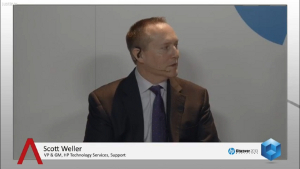 NEWS
NEWS
 NEWS
NEWS
 NEWS
NEWS
![]() Scott Weller, VP & GM, HP Technology Services, Support, discussed the trends of cloud adoption in the enterprise with theCUBE co-hosts Dave Vellante and John Furrier, live at this year HP Discover event in Barcelona.
Scott Weller, VP & GM, HP Technology Services, Support, discussed the trends of cloud adoption in the enterprise with theCUBE co-hosts Dave Vellante and John Furrier, live at this year HP Discover event in Barcelona.
Commenting on the vibe of the European event, Weller said “this event gets better and better every time. The customers that show up at these events tend to be more senior, more in the C-level ranks.” He added, “this year we’ve got so many announcements, it’s really hard to count them,” the star being HP flexible capacity service which “will be a real game changer in the market.”
Asked to comment on the idea that the cloud is now mainstream and part of full deployment architectures, Weller said we were well past the idea that “cloud is interesting, but not for me.” Customers are now focusing on determining how to get the right balance of workloads inside and outside of the firewall and how to make it a mainstream part of their operations. Thus there is a focus on the technology and services helping them solve the problem.
Commenting on the statement that 10 percent of customers say they are pursuing a public cloud strategy, Weller said “I think it’s almost self-evident. It’s easy enough if you’ve got no presence in the data center to talk about how everything is public cloud. Every real business with real workloads” has to have a well thought, planned strategy to get workloads outside the firewall, he explains. “Clearly hybrid is there, this is not a symptom of the business we are in, it’s the reality of our customers.”
“Customers really want a lot of elasticity and they want the economics the public cloud can offer, but they also want to keep their IT on premise,” Weller said. A lot of customers have their own practices and policies that make the move to the cloud very difficult. HP’s Flexible Capacity service solves that issue.
Flexible Capacity offers public cloud services using a hybrid, flexible pricing model. It works by installing the assets and taking the risk away. Customers don’t want lock in, or complexity, and to risk to much, “we take that into equation.”
Asked to define ‘enterprise grade,’ Weller said it was an “elusive term for users. Enterprise grade really boils down to ‘do I have any consistency and certainty into the equation.'” It also requires architecture resilience, customers need the confidence that there won’t be an outage, and if there is one, they need to know what is going to happen in what time frame.
HP Flexible capacity can be pre-built from a blue print approach. “We have to go in and collaborate on building a model. We have these sort of blue prints versions that customers can choose from but those have to be tuned to get the most out of it,” Weller explained. “The capacity is there, it’s available immediately.” But its usage varies based on whether the work load is a traditional model one or based on a cloud system approach.
“The reality is that there are all of these different workloads, and that is the reason behind our strategy for the hybrid,” Weller stated. CIOs ask from IT to deliver the same economics, agility, and flexibility of public cloud, and are only open to paying a small premium for on-premise. This defines the new style of IT, “I need fast and flexible, I need on demand, I need to pay as I go, and I need the peace of mind of on premise.”
Asked where he saw enterprises progressing their cloud strategy, Weller said “every customer that I talk to now is saying ‘if I haven’t built a private cloud I am building it this year.'” They are focusing on understanding how and what and when they can transition some workloads in the public cloud. “Some are looking to bring workloads back as the economics change for on premise. There is a maturity curve out there, however you draw it, private cloud is here, everyone is building one or built one this year.”
Commenting on the role hybrid cloud plays in this shift, Weller said “hybrid is a way of life, it’s not a halfway house.” John Furrier added that, in a way, public cloud is the halfway house.
As far as the hybrid and private cloud strategy connection to OpenStack is concerned, Weller said HP does not define itself as the stewards of OpenStack. “We believe that this is a truly open, participative activity. We believe that this is what the industry needs. OpenStack is the great leveler in the market.”
Support our mission to keep content open and free by engaging with theCUBE community. Join theCUBE’s Alumni Trust Network, where technology leaders connect, share intelligence and create opportunities.
Founded by tech visionaries John Furrier and Dave Vellante, SiliconANGLE Media has built a dynamic ecosystem of industry-leading digital media brands that reach 15+ million elite tech professionals. Our new proprietary theCUBE AI Video Cloud is breaking ground in audience interaction, leveraging theCUBEai.com neural network to help technology companies make data-driven decisions and stay at the forefront of industry conversations.